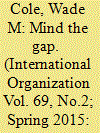|
|
|
Sort Order |
|
|
|
Items / Page
|
|
|
|
|
|
|
| Srl | Item |
| 1 |
ID:
107532


|
|
|
|
|
| Publication |
2011.
|
| Summary/Abstract |
Several prominent human rights treaties seek to minimize violations during emergencies by authorizing states to "derogate"-that is, to suspend certain civil and political liberties-in response to crises. The drafters of these treaties envisioned that international restrictions on derogations, together with international notification and monitoring mechanisms, would limit rights suspensions during emergencies. This article analyzes the behavior of derogating countries using new global data sets of derogations and states of emergency from 1976 to 2007. We argue that derogations are a rational response to domestic political uncertainty. They enable governments facing serious threats to buy time and legal breathing space from voters, courts, and interest groups to confront crises while signaling to these audiences that rights deviations are temporary and lawful. Our findings have implications for studies of treaty design and flexibility mechanisms, and compliance with international human rights agreements.
|
|
|
|
|
|
|
|
|
|
|
|
|
|
|
|
| 2 |
ID:
139801


|
|
|
|
|
| Summary/Abstract |
According to recent studies, international human rights treaties are ineffective, counterproductive, or else beneficial for only those countries that tend to respect human rights regardless of treaty membership. Analysts often attribute gaps between human rights principles and practices to willful disobedience, self-interested defection, and ineffective enforcement. Using two-stage regression models to analyze compliance with the International Covenant on Civil and Political Rights, I examine whether countries' inability (as opposed to unwillingness) to implement treaty terms is also responsible for the gap between commitment and compliance. I find that one dimension of state capacity in particular—bureaucratic efficacy—enhances levels of compliance with civil, political, and physical integrity rights provisions. These findings lend credence to an important aspect of the managerial approach—that noncompliance is often inadvertent and conditioned by a state's ability to implement treaty terms.
|
|
|
|
|
|
|
|
|
|
|
|
|
|
|
|
| 3 |
ID:
139523


|
|
|
|
|
| Summary/Abstract |
Among the explanations for state ratification of human rights treaties, few are more common and widely accepted than the conjecture that states are rewarded for ratification by other states. These rewards are expected to come in the form of tangible benefits—foreign aid, trade, and investment—and intangible benefits such as praise, acceptance, and legitimacy. Surprisingly, these explanations for ratification have never been tested empirically. We summarize and clarify the theoretical underpinnings of “reward-for-ratification” theories and test these propositions empirically by looking for increased international aid, economic agreements, and public praise and recognition following ratification of four prominent human rights treaties. We find almost no evidence that states can expect increased tangible or intangible rewards after ratification. Given the lack of empirical support, alternative explanations seem more appealing for understanding human rights treaty ratification.
|
|
|
|
|
|
|
|
|
|
|
|
|
|
|
|
| 4 |
ID:
168543


|
|
|
|
|
| Summary/Abstract |
Enforcement of international law is often delegated to national courts, creating a space for them to play a part in international judicialization. Under what conditions can they do so? We argue that the answer depends on the relationship between the political and legal constraints national courts face. National courts must be careful to safeguard their independence in the face of potential backlash, but they face constraints in terms of the legal mechanisms available to them when enforcing international law. We focus on the availability of two legal mechanisms: direct effect, under which courts apply treaties directly, setting aside inconsistent domestic laws; and canons of interpretation, under which courts strive to interpret domestic laws in conformity with treaties. We find that the effects of human rights treaty ratification is greater when courts have the canon available to them than it is when courts have direct effect available to them.
|
|
|
|
|
|
|
|
|
|
|
|
|
|
|
|
| 5 |
ID:
097079


|
|
|
|
|
| Publication |
2010.
|
| Summary/Abstract |
The United States prides itself on being a champion of human rights and pressures other countries to improve their human rights practices, and yet appears less willing than other nations to embrace international human rights treaties. Many commentators attribute this phenomenon to the particular historical context that existed in the late 1940s and early 1950s when human rights treaties were first being developed. These commentators especially emphasize the race relations of the time, noting that some conservatives resisted the developing human rights regime because they saw it as an effort by the federal government to extend its authority to address racial segregation and discrimination in the South. As this essay explains, the guarded and qualified U.S. relationship with human rights treaties stems not only from a particular moment in history but also is a product of more enduring, and less obviously problematic, features of the U.S. constitutional system.
|
|
|
|
|
|
|
|
|
|
|
|
|
|
|
|
|
|
|
|
|